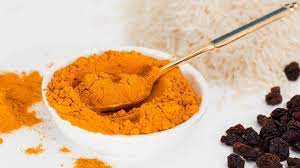Do you suffer from migraines? If so, you may be interested to know that curcumin, the active chemical found in turmeric, may be able to help with your migraines. In recent years, there has been a growing body of evidence indicating that curcumin is a powerful anti-inflammatory and can reduce the frequency and severity of migraines. In this blog post, we’ll take a closer look at the potential benefits of curcumin for migraine sufferers, as well as ways to get more of it into your diet.
What is curcumin?
Curcumin is the active chemical in turmeric, a spice that is widely used in Indian cooking and in traditional medicine. It has a strong yellow color and a unique flavor and aroma. Studies have shown that curcumin may have powerful anti-inflammatory properties, and it is also believed to be beneficial for a range of other conditions, including migraines.
The exact mechanism by which curcumin may help with migraines is not yet clear, however, some studies suggest that it may reduce inflammation, improve blood circulation, and help to balance the body’s hormones, all of which can contribute to the prevention of migraines. Additionally, curcumin has been shown to have antioxidant activity which may help protect cells from damage and reduce the oxidative stress that can lead to migraine headaches.
As further research into curcumin’s effects on migraines is still ongoing, there is no definitive answer as to how it may help, but the potential benefits make it worth exploring as an alternative treatment option. If you’re looking for natural ways to ease your migraine pain, adding turmeric or a curcumin supplement to your diet could be a good place to start.
What does the research say?
When it comes to treating migraines, many people turn to conventional medications or home remedies. But recent research suggests that curcumin, the active ingredient in turmeric, could be an effective natural remedy for migraine headaches.
A recent study involving 40 participants, 20 of whom were experiencing migraines, looked into the effects of curcumin on migraine frequency and intensity. Those taking the supplement experienced a significant reduction in the number of headaches they experienced each month, along with a decrease in the intensity of the pain.
The study also found that those taking curcumin had fewer episodes of nausea and vomiting associated with their migraines. Additionally, there were no serious side effects reported, suggesting that curcumin is generally safe to use for migraine relief.
While more research needs to be done on this topic, the results of this study suggest that curcumin could be a promising natural treatment for migraines. If you suffer from frequent migraines, talk to your doctor about whether or not taking a curcumin supplement is right for you.
How can I take curcumin?
Curcumin is the active chemical found in turmeric and has been studied for its potential ability to help treat migraines. Studies have shown that curcumin can help reduce pain and inflammation associated with migraine headaches.
If you’re interested in exploring the potential benefits of curcumin for your migraines, there are a few different ways to take it.
One way is to supplement with curcumin capsules, which are widely available online and at health food stores. Most capsules contain 500-2000 mg of curcumin per dose. It’s important to read the labels carefully and follow the instructions to make sure you get the right dosage for you.
You can also add curcumin to your diet by cooking with it. Turmeric powder is a great way to add flavor to dishes and also get some of the benefits of curcumin. You can add a teaspoon or two of turmeric to soups, sauces, and stews, or try it in smoothies, juices, or teas.
Finally, you can apply curcumin topically in the form of an ointment, cream, or oil. This method helps target areas of the body that may be affected by migraines, like temples and forehead. Make sure to read the directions carefully and follow them closely before applying.
By exploring all these options, you can find the best way to incorporate curcumin into your life and potentially gain relief from migraines.
Are there any side effects?
Although the research on curcumin and migraines is still in its early stages, it looks like this natural supplement may be able to help relieve migraine symptoms. However, it’s important to keep in mind that there are some potential side effects associated with using curcumin.
First, curcumin can interact with certain medications, including anticoagulants, anti-inflammatories, blood thinners, and anti-diabetic medications. This means that it’s important to talk to your doctor before taking curcumin if you are already taking these types of medications.
In addition, some people may experience gastrointestinal issues when taking curcumin. This can include nausea, diarrhea, and stomach pain. If you experience any of these symptoms, it’s important to speak to your doctor to ensure that curcumin is the right supplement for you.
Lastly, there have been reports of allergic reactions to curcumin. These reactions can range from mild skin rashes to more serious conditions like anaphylaxis. If you experience any type of allergic reaction while taking curcumin, it’s important to stop taking it immediately and speak to your doctor.
In conclusion, there are some potential side effects associated with taking curcumin as a supplement. However, if used correctly and with the guidance of a healthcare professional, it may be able to help provide some relief from migraine symptoms. Before taking curcumin, make sure you discuss any risks and benefits with your doctor.
Bottom line
Migraines can be incredibly debilitating, and they often have no clear cause. Many people find relief in conventional treatments like medications or lifestyle changes, but if you’re looking for an additional natural remedy, curcumin may be worth a try.
Curcumin is the active chemical in turmeric, a spice commonly used in Indian cooking. Research suggests that curcumin could reduce inflammation and provide pain relief in people with migraines. While more research is needed to confirm these results, studies in animals suggest that curcumin may be effective for reducing migraine symptoms.
Curcumin is widely available as a dietary supplement, so it’s easy to incorporate into your routine. However, it’s important to speak with your doctor before taking any supplements. They can help you find the right dosage and monitor your progress.
Curcumin is the active chemical in turmeric, and research suggests it may help reduce inflammation and provide relief from migraine pain. However, more research is needed to confirm these results. If you’re interested in trying curcumin as a natural remedy, talk to your doctor first to ensure it’s safe and the right dosage for you.



